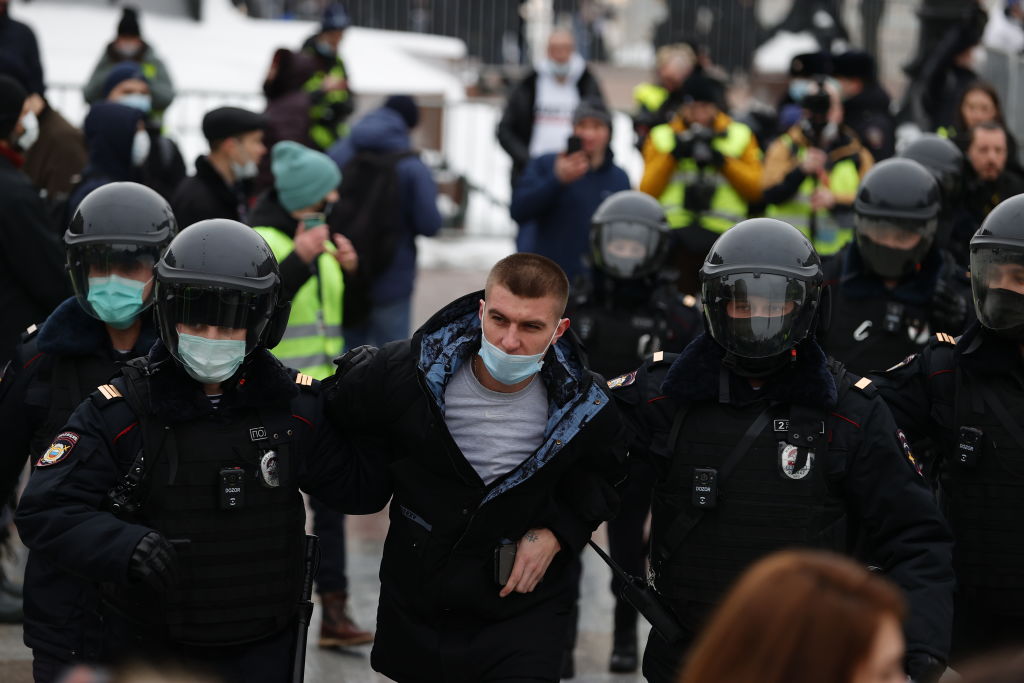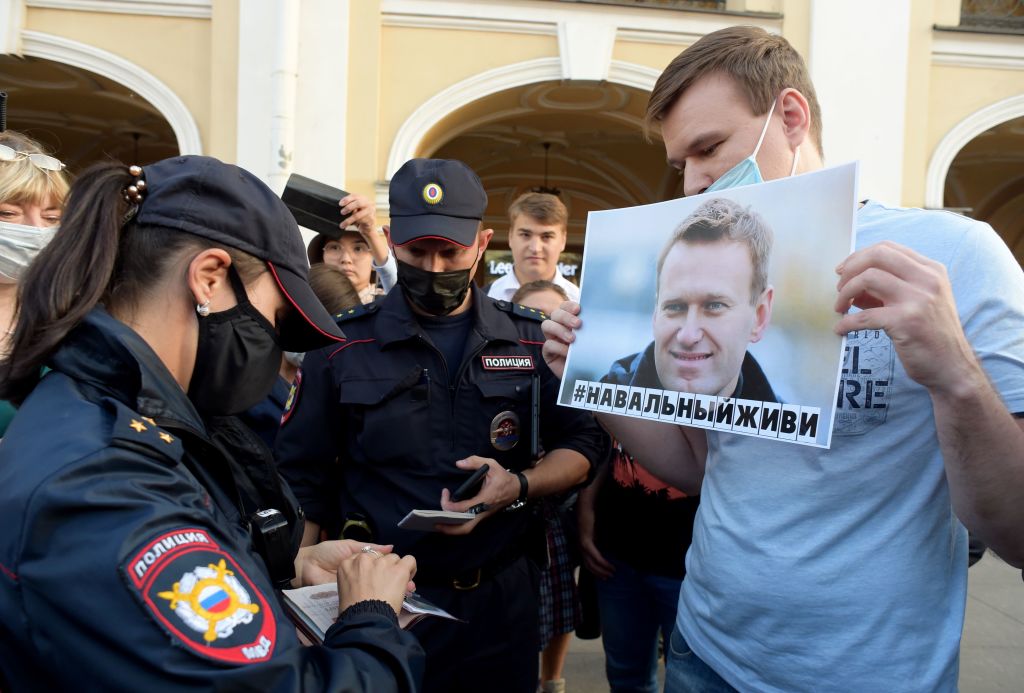
Russian police have detained more than 3,700 people across the country according to OVD-Info, a Moscow-based NGO monitoring rallies, as anti-government protests surged in about 100 cities and towns on Saturday. Thousands of people took to the streets from Moscow to the Far East, battling the bitter cold, in some of the largest protests against Russian President Vladimir Putin in years. In Moscow, where Reuters estimated that 40,000 people turned up to protest in Moscow (the Ministry of Internal Affairs said it was about 4,000) riot police were seen beating and dragging protestors away.
The U.S. State Department on Saturday condemned “harsh tactics” used against protesters and journalists. “We call on Russian authorities to release all those detained for exercising their universal rights and for the immediate and unconditional release of Aleksey Navalny,” the statement read. The E.U foreign policy chief, Josep Borrell Fontelles, said the bloc’s foreign ministers will discuss the Russian crackdown on Monday. “I deplore widespread detentions, disproportionate use of force, cutting down internet and phone connections,” he wrote in a tweet on Saturday.
At an online press conference on Saturday, Russian democracy activist and chairman of the Boris Nemtsov Foundation for Freedom Vladimir Kara-Murza expressed hope despite the crackdown. “It’s exciting to see the awakening of society,” he said. “For many years the Putin regime stood not just on repression, its propaganda machine […] but also, to be frank, the passive acquiescence and silence of a significant part of Russian society […] Among the young generation we no longer see that. Mostly importantly, we no longer see that fear,” he said.
Nationwide protests surged this weekend after the arrest of Russian opposition activist and fierce Kremlin critic Alexei Navalny last week. Ahead of the demonstrations, authorities had detained Navalny aides and restricted online information about the protests, which the Kremlin called illegal.
Read More: How Russia’s Opposition Movement Wants Biden to Confront Putin
Navalny, head of Russia’s Anti-Corruption Foundation, was immediately detained by Russian authorities when he returned to Moscow on Jan. 17 from Germany, where he had spent five months recovering from a near-fatal nerve agent poisoning that he and some Western governments blamed on the Kremlin. The opposition activist now faces charges of violating the terms of a suspended prison sentence from a 2014 money-laundering case that could see him jailed for three and a half years. In a message to his supporters filmed shortly before he was placed in Moscow’s Matrosskaya Tishina prison, notorious for housing high-ranking prisoners, Navalny urged his supporters to take part in the protests.
The protests are a defining moment for the opposition as President Vladimir Putin, who has been in power since 2000, increasingly seeks to silence the opposition. Although Navalny remains a polarizing figure in Russia—a September survey by the Levada Center, an independent pollster in Moscow, found that 20% of Russians support Navalny’s work, while 50% disapprove—dissatisfaction against the Putin regime is growing. “[The protests] will speak more about the strength of the opposition against Putin, than Navalny’s popularity,” says Tatiana Stanovaya, founder of Moscow-based political consultancy firm, R. Politik.
A major driving force behind the protests, says Stanovaya, is Navalny’s video exposé earlier this week claiming that Putin spent $1.35 billion in illicit funds provided by members of his inner circle to build an opulent palace in a Black Sea resort town. The investigation, posted to the activist’s YouTube channel on Jan. 19, has been viewed more than 58 million times. Dmitry Peskov, Putin’s spokesperson, has called the claims “pure nonsense.” Videos on Saturday showed protestors in the far eastern city of Vladivostok shouting “Putin is a thief!”
In a question and answer session with students on Monday, Putin said he “did not have time” to watch the video, but claimed that “nothing listed there has ever belonged to me or my close relatives”. Stanovaya wrote that “By responding at all to Navalny’s palace investigation, Putin has partially legitimized Navalny’s nationwide protests and indirectly acknowledged the public backlash.”
Moscow authorities warned on Friday that Saturday’s unauthorized demonstrations will be “immediately suppressed.” On Wednesday and Thursday, police began showing up at the homes of opposition figures, activists and journalists across Russia to warn them against participating in the rallies, and on Thursday they detained Navalny supporters, including his press secretary, Kira Yarmysh and a top investigator Georgy Alburov who assisted with the palace investigation, for inciting unauthorized protests.
Read More: How Putin Built a Ragtag Empire of Tyrants and Failing States
The stakes are especially high for demonstrators. Since a controversial 2014 law came into force, following mass protests in 2011 and 2012 over allegedly rigged parliamentary elections, Russians found guilty of participating in an unsanctioned protest, picket or march several times within a six-month period face up to five years in prison. “The authorities will not hesitate to disperse the protests. This does not exclude the use of force,” says Stanovaya.

How the Kremlin cracked down on online promotion for the protests
Russia’s media watchdog Roskomnadzor on Wednesday cautioned social media platforms against encouraging minors to join the protests. “[We] will prosecute Internet sites for involving adolescents in illegal activities,” the watchdog said, adding that failure to remove “banned information”—posts encouraging people to join the protests — could result in fines of up to 4 million rubles ($53,000).
The warning came as social media was flooded with videos promoting the protests. TikTok videos using the hashtag “Free Navalny” (#свободунавальному) have brought in more than 120 million views. Russian TikTok users have recorded themselves packing their bags for Saturday’s protest. “I want to live in a free country, I’m not afraid to protest,” one user wrote. Others are seen taking down Putin’s portrait from the walls of their classrooms and replacing it with Navalny’s photo.
According to a report on Friday from Roskomnadzor, TikTok has deleted 38% of its content with videos about Saturday’s protest, while YouTube and Russian social media site VKontakte has removed half of their content calling on minors to join the rallies and Facebook-owned Instagram 17%.
A Facebook spokesperson, however, said the content remains on the platform “since it doesn’t violate [their] Community Standards.”
The Russian Prosecutor’s Office warned that Internet traffic will be monitored to “restrict access to illegal information,” and that people found in breach “have been warned against breaking the law.” Police are “focused on taking preventive measures, and if there are grounds, bringing the perpetrators to administrative responsibility,” it said in a Thursday press release.
What’s next for the opposition?
A crackdown on protests, in addition to the arrest of Navalny, could mark a new wave of repression on opposition voices ahead of Russia’s parliamentary elections scheduled for September.
With support for Putin’s United Russia hovering at around 31%, according to the state-run pollster WCIOM, and the country battling a deep economic recession amid the pandemic, the president faces a challenge like never before in maintaining a supermajority.
Read More: Putin’s Plan to Rewrite Russia’s Constitution Could Allow Him to Lead for Years to Come
Ben Noble, a lecturer in Russian politics at University College London, says the crackdown will only intensify as Putin attempts to hold into power. “We’re likely to see the Kremlin do even more than it has in the past to un-level the electoral playing field, from blocking opposition candidates, mobilizing state employees to support United Russia, and further hampering the work of Navalny’s team ahead of the elections,” he says.
But even if Navalny ends up in prison, Noble says he has invested “so much into developing the organizational capacity of ‘Team Navalny'” that “smart voting,” a strategy of voting for the strongest candidate most likely to unseat a United Russia candidate, is likely to continue even in his absence. “Smart voting” is designed to weaken Putin’s grip on power by “coordinating voters—who might be split in supporting different opposition political parties—to unite around a single candidate,” Noble says.
In the 2019 Moscow city elections—the first vote targeted by “smart voting”—the ruling party lost a third of its seats on the city council and saw its majority slashed to just five. In the longer term, “Team Navalny” hopes that smart voting succeeds in “toppling more United Russia candidates and encourages Russians—especially those who currently regard voting as pointless, given United Russia’s dominance—to vote,” Noble adds.
“They can disperse it, limit it,” says Stanovaya. “But the Kremlin can’t stop the opposition movement.”
More Must-Reads From TIME
- The 100 Most Influential People of 2024
- The Revolution of Yulia Navalnaya
- 6 Compliments That Land Every Time
- Stop Looking for Your Forever Home
- If You're Dating Right Now , You're Brave: Column
- The AI That Could Heal a Divided Internet
- Fallout Is a Brilliant Model for the Future of Video Game Adaptations
- Want Weekly Recs on What to Watch, Read, and More? Sign Up for Worth Your Time
Contact us at letters@time.com